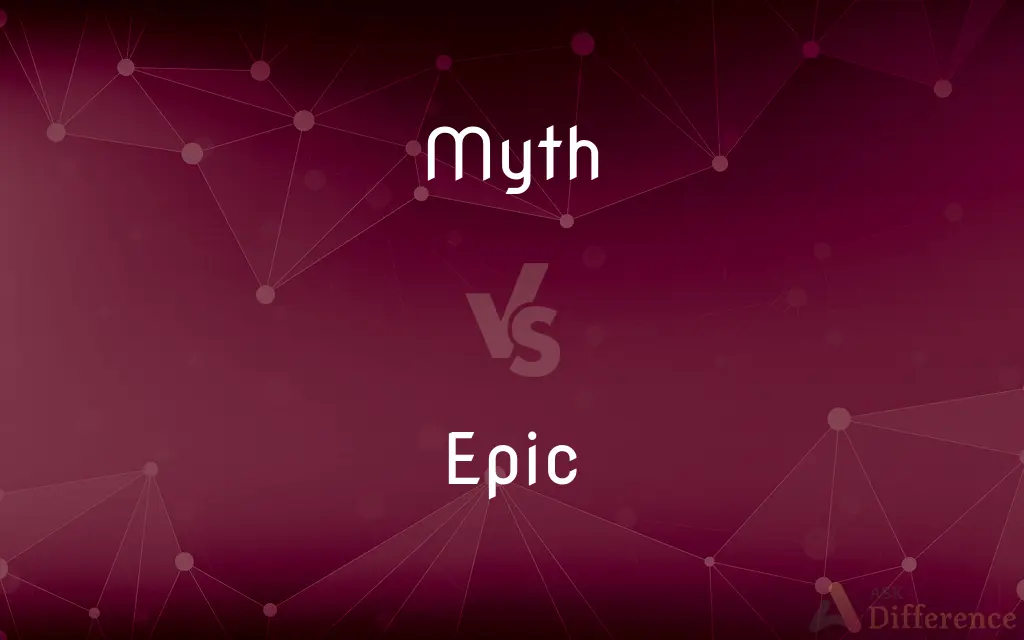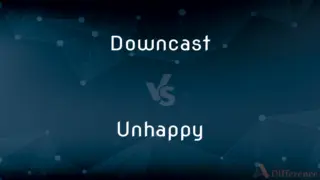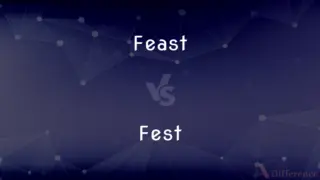Myth vs. Epic — What's the Difference?
By Tayyaba Rehman & Fiza Rafique — Updated on March 4, 2024
Myths are traditional stories explaining natural or social phenomena, often involving gods or supernatural beings. Epics are lengthy narrative poems, celebrating heroic deeds and adventures.

Difference Between Myth and Epic
Table of Contents
ADVERTISEMENT
Key Differences
A myth is a traditional story rooted in a culture's beliefs, designed to explain the universe, natural occurrences, and societal norms through the actions of gods, supernatural beings, or ancestral heroes. These stories often carry moral or spiritual lessons and are passed down through generations. On the other hand, an epic is a specific literary forma lengthy narrative poem that focuses on the extraordinary deeds of a hero who embodies the values of a particular society. Epics often involve adventures, battles, and journeys, and they serve to inspire, entertain, and educate about cultural heritage and virtues.
While myths primarily serve to explain the unknown and teach cultural values through allegorical tales, epics celebrate the achievements and courage of individuals facing vast challenges. Epics, such as Homer's "The Iliad" and "The Odyssey," or the Indian "Mahabharata," are characterized by their grandiose scale, formal structure, and the inclusion of divine intervention in human affairs. Conversely, myths like the Greek creation myths or Norse mythology's tales provide frameworks for understanding the cosmos, human nature, and the essence of existence.
Epics are distinguished not only by their length and narrative depth but also by their use of elevated language, formal diction, and stylistic devices that enhance their storytelling and moral undertones. Myths, while they may also be shared orally and written in engaging ways, do not typically adhere to the strict poetic structures found in epics. The focus of myth is more on the foundational stories of a culture rather than the literary artistry or the heroism of a single protagonist.
Another key difference lies in the scope and purpose: myths often have a cosmological or theological focus, aiming to bridge the human with the divine and explain the unexplainable. Epics, while they may incorporate mythological elements and gods, primarily focus on human experiences, heroism, and the historical or semi-historical past of a people. This focus makes epics a rich source of information about the social, political, and moral ethos of the culture from which they originate.
Both myths and epics play crucial roles in shaping the identity and values of societies. Myths delve into the spiritual and existential questions of human life, offering explanations and symbols that resonate with the collective unconscious. Epics, through the narrative of a hero's journey, reflect the ideals of bravery, honor, and morality that define a culture, serving as a unifying force and a source of national pride.
ADVERTISEMENT
Comparison Chart
Definition
Traditional story explaining natural/social phenomena
Lengthy narrative poem celebrating heroic deeds
Purpose
Explain the unknown, teach values
Inspire, entertain, educate on cultural heritage
Characters
Gods, supernatural beings, ancestors
Heroes embodying cultural values
Structure
Varies, often orally transmitted
Formal, with elevated language and stylistic devices
Focus
Cosmological/theological, moral lessons
Human experiences, heroism, historical/semi-historical
Cultural Role
Shapes identity, explains universe and existence
Reflects ideals, unifies society, source of national pride
Compare with Definitions
Myth
Each culture has its own unique set of myths.
Japanese myths often involve spirits of nature known as kami.
Epic
Centers on a protagonist who represents cultural ideals.
Beowulf's strength and bravery make him a revered figure in his epic.
Myth
A story that explains natural or social phenomena through supernatural beings or ancestral heroes.
The myth of Persephone explains the seasons.
Epic
Utilizes elevated language and specific poetic devices.
The use of dactylic hexameter in The Aeneid by Virgil.
Myth
Often contains teachings relevant to society's values and norms.
The Norse myths emphasized the importance of courage and honor.
Epic
A long narrative poem detailing the adventures and deeds of a hero.
The Odyssey follows Odysseus' long journey home from the Trojan War.
Myth
Features gods, goddesses, and mythical creatures.
In Greek mythology, Zeus ruled over the gods and humans.
Epic
Often includes interactions between heroes and gods.
In The Iliad, gods frequently intervene in the affairs of mortals.
Myth
Provides insight into the beliefs and values of ancient cultures.
Egyptian myths were closely tied to their views on the afterlife and cosmos.
Epic
Reflects the morals, values, and history of a society.
The Mahabharata offers a window into ancient Indian philosophy and duty.
Myth
A traditional, typically ancient story dealing with supernatural beings, ancestors, or heroes that serves as a fundamental type in the worldview of a people, as by explaining aspects of the natural world or delineating the psychology, customs, or ideals of society
The myth of Eros and Psyche.
A creation myth.
Epic
An extended narrative poem in elevated or dignified language, celebrating the feats of a legendary or traditional hero.
Myth
Myth is a folklore genre consisting of narratives that play a fundamental role in a society, such as foundational tales or origin myths. The main characters in myths are usually non-humans, such as gods, demigods, and other supernatural figures.
Epic
A literary or dramatic composition that resembles an extended narrative poem celebrating heroic feats.
Myth
A popular belief or story that has become associated with a person, institution, or occurrence, especially one considered to illustrate a cultural ideal
A star whose fame turned her into a myth.
The pioneer myth of suburbia.
Epic
A series of events considered appropriate to an epic
The epic of the Old West.
Myth
A traditional story which embodies a belief regarding some fact or phenomenon of experience, and in which often the forces of nature and of the soul are personified; a sacred narrative regarding a god, a hero, the origin of the world or of a people, etc.
Epic
Of, constituting, having to do with, or suggestive of a literary epic
An epic poem.
Myth
A commonly-held but false belief, a common misconception; a fictitious or imaginary person or thing; a popular conception about a real person or event which exaggerates or idealizes reality.
Scientists debunk the myth that gum stays in the human stomach for seven years.
Epic
Surpassing the usual or ordinary, particularly in scope or size
"A vast musical panorama ... it requires an epic musical understanding to do it justice" (Tim Page).
Myth
A story of great but unknown age which originally embodied a belief regarding some fact or phenomenon of experience, and in which often the forces of nature and of the soul are personified; an ancient legend of a god, a hero, the origin of a race, etc.; a wonder story of prehistoric origin; a popular fable which is, or has been, received as historical.
Epic
Narrated in a grand style; pertaining to or designating a kind of narrative poem, usually called an heroic poem, in which real or fictitious events, usually the achievements of some hero, are narrated in an elevated style.
The epic poem treats of one great, complex action, in a grand style and with fullness of detail.
Myth
A traditional story accepted as history; serves to explain the world view of a people
Common Curiosities
What is the main purpose of myths?
Myths aim to explain the mysteries of the universe and teach cultural values.
Do myths have any historical basis?
While myths may incorporate historical elements, they primarily serve to explain phenomena through allegory and symbolism.
How do epics differ from ordinary stories?
Epics are distinguished by their length, formal structure, and focus on heroic deeds.
Why are epics important to cultural heritage?
Epics encapsulate the ideals, morals, and historical narratives that define a culture.
How are epics transmitted through cultures?
Epics are often orally passed down before being written, preserving cultural narratives.
Are the characters in myths always fictional?
Mythical characters often include gods and supernatural beings, though they may be based on historical figures.
Can modern stories be considered myths or epics?
Modern stories that fulfill the functions of explaining phenomena or celebrating heroism can be seen as contemporary myths or epics.
Why do different cultures have distinct myths and epics?
Myths and epics reflect the unique values, beliefs, and historical experiences of each culture.
Can myths and epics overlap?
Yes, epics can incorporate mythological elements, and myths can feature epic heroes.
What makes a hero in an epic?
A hero in an epic embodies the virtues and ideals esteemed by the culture from which the epic originates.
Share Your Discovery

Previous Comparison
Downcast vs. Unhappy
Next Comparison
Feast vs. FestAuthor Spotlight
Written by
Tayyaba RehmanTayyaba Rehman is a distinguished writer, currently serving as a primary contributor to askdifference.com. As a researcher in semantics and etymology, Tayyaba's passion for the complexity of languages and their distinctions has found a perfect home on the platform. Tayyaba delves into the intricacies of language, distinguishing between commonly confused words and phrases, thereby providing clarity for readers worldwide.
Co-written by
Fiza RafiqueFiza Rafique is a skilled content writer at AskDifference.com, where she meticulously refines and enhances written pieces. Drawing from her vast editorial expertise, Fiza ensures clarity, accuracy, and precision in every article. Passionate about language, she continually seeks to elevate the quality of content for readers worldwide.















































